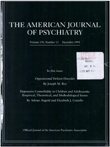Implications of self-reported cognitive and motor dysfunction in HIV- positive patients
Abstract
OBJECTIVE: The authors examined HIV-positive subjects to determine the relationship of patient complaints of cognitive and motor dysfunction to psychiatric status and performance on established cognitive and motor function tests. METHOD: HIV-positive volunteers (N = 77) were evaluated at entry into a longitudinal neurological study. Forty were asymptomatic, 29 had AIDS-related complex, and eight had AIDS. The subjects were not selected for the presence or absence of cognitive or motor complaints. Complaints of cognitive and motor dysfunction were assessed with items from the AIDS Clinical Trials Group Macro Neurologic Exam. Current depression and anxiety were assessed with the Profile of Mood States. Psychiatric status was assessed with the NIMH Diagnostic Interview Schedule, a structured interview that provides DSM- III psychiatric diagnoses. Actual cognitive and motor performance was measured with standard neuropsychological tests known to be sensitive to the effects of HIV. RESULTS: Cognitive complaints were found in 38 (49%) of the subjects. These complaints were associated with psychiatric symptoms but not with cognitive performance. Motor complaints, found in 12 (16%) of the subjects, were associated with poorer motor performance but not with psychiatric symptoms. The overall frequency of psychiatric diagnosis was high. CONCLUSIONS: Self-reports of cognitive and motor dysfunction were common in this unselected group and are of concern to health care providers. Potentially treatable psychiatric conditions were also common, particularly in subjects with cognitive complaints, and appropriate treatment referrals are indicated. Patients who report motor dysfunction should be neurologically evaluated for treatable causes.
Access content
To read the fulltext, please use one of the options below to sign in or purchase access.- Personal login
- Institutional Login
- Sign in via OpenAthens
- Register for access
-
Please login/register if you wish to pair your device and check access availability.
Not a subscriber?
PsychiatryOnline subscription options offer access to the DSM-5 library, books, journals, CME, and patient resources. This all-in-one virtual library provides psychiatrists and mental health professionals with key resources for diagnosis, treatment, research, and professional development.
Need more help? PsychiatryOnline Customer Service may be reached by emailing [email protected] or by calling 800-368-5777 (in the U.S.) or 703-907-7322 (outside the U.S.).



